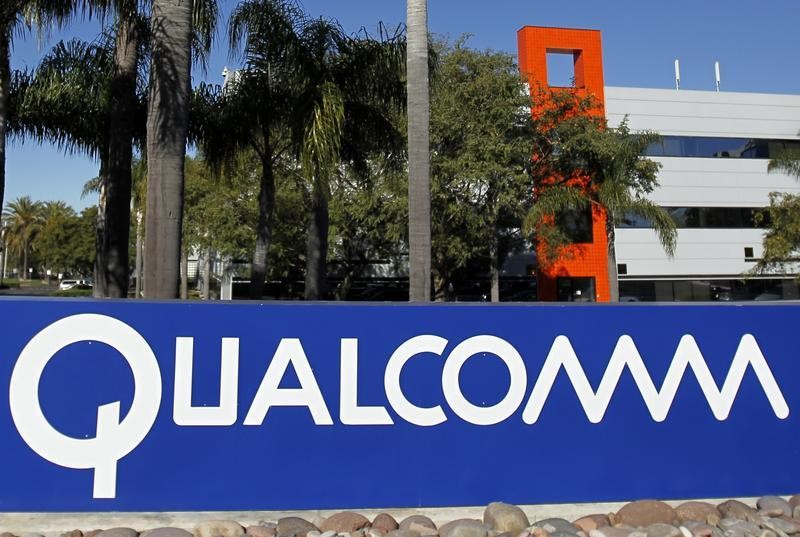By Stephen Nellis
(Reuters) -Qualcomm executives on Tuesday said they were “positive” on President-elect Donald Trump’s incoming administration and were not concerned that proposed U.S. tariffs would dampen the nearly half of Qualcomm (NASDAQ:)’s sales derived from the China.
Qualcomm executives made the remarks at an investor event in New York during which the company forecast $22 billion in combined revenue over the next five years from laptops, cars and other products outside its current stronghold in smartphones, a sharp growth from its latest fiscal year.
During a question-and-answer session with analyst, Alex Rogers (NYSE:), who runs Qualcomm’s technology licensing business, said the San Diego, California, company had a “great relationship” with Trump’s previous administration, which blocked a hostile takeover bid for Qualcomm from rival Broadcom (NASDAQ:).
“We expect a good relationship going forward. We’re very positive on the recent pick for Commerce Secretary, so we are expecting to have a good relationship and to be engaged as we have been through this past administration,” Rogers said, referencing Trump’s expected nomination of Howard Lutnick.
Responding to another analyst question, Qualcomm Chief Executive Cristiano Amon said he does not foresee problems competing for business in China, which accounted for 46% of Qualcomm’s nearly $40 billion in revenue in its most recent fiscal year. Trump has proposed tariffs of 60% on Chinese imports, which economists have said China might respond to with tariffs of its own on American goods.
For now, Amon said Chinese firms are buying Qualcomm’s automotive chips, and that the last round of Trump tariffs on Chinese goods did not hurt Qualcomm.
“As geopolitics started to become front and center in the U.S.-China conversation, the Qualcomm partnerships with China actually increased, as we expanded to other industries” beyond smartphones, Amon said.
Qualcomm has been burnt before by U.S.-China trade tensions. In 2018, it was forced to walk away from a $44 billion deal to buy NXP Semiconductors (NASDAQ:) – which would have been the biggest chip takeover globally – after failing to secure Chinese regulatory approval.
In fiscal 2024 that ended Sept. 29, Qualcomm reported revenue totaling $8.32 billion from the same set of chip categories, which made up just a third of the $24.86 billion it made from smartphone chips.
San Diego, California-based Qualcomm is the world’s top supplier of mobile phone chips that connect handsets to mobile data networks.
The company has been working to diversify its offerings, winning deals with companies including General Motors (NYSE:) to supply chips for the dashboards and driver-assistance systems in vehicles, and collaborating closely with Microsoft (NASDAQ:) and PC makers to compete against Intel (NASDAQ:) and Advanced Micro Devices (NASDAQ:) in the laptop market.
Qualcomm is also grappling with the long-term decline of its business from Apple (NASDAQ:), which is developing its own wireless modem chips. Akash Palkhiwala, Qualcomm’s finance chief and chief operating officer, said the new categories would offset those sales losses.
“This growth in annual revenue far exceeds the scale of the Apple chipset business revenues today,” he said during the event.
Qualcomm said it expects $8 billion in automotive chip revenue by fiscal 2029, and $4 billion from PCs. It expects $2 billion from augmented and mixed-reality headsets, such as those made by Meta Platforms (NASDAQ:) that already feature Qualcomm chips.
The company expects $4 billion in industrial chips that help connect factory machines to networks, as well as $4 billion for chips for the internet-of-things (IoT), a broad category that includes devices such as wireless headphones and smart home gadgets such as cameras.
In the just reported fiscal 2024, the company posted a dip in IoT revenue to $5.4 billion, sharply missing its own forecast from a similar investor day in 2021 of $9 billion by fiscal 2024.
Qualcomm’s shares have risen about 13.7% to this year, only about half of the 25% rise in the .
Its business remains highly concentrated in smartphones. Together with Apple, Samsung Electronics (KS:) and Xiaomi (OTC:) help make up more than half of the company’s $39.96 billion in revenue for its most recent fiscal year.
Read the full article here
















